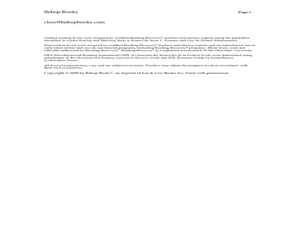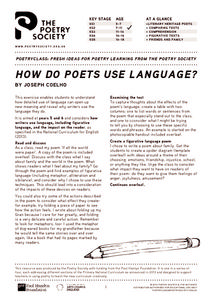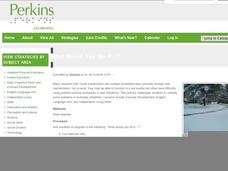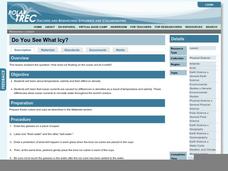Curated OER
Do You Want to Be My Friend?
Learners participate in a variety of emergent and early-literacy activities based on a "friendship" theme. Learners listen to the book Do You Want to Be My Friend by Eric Carle, then echo read, choral read, and independently read...
Curated OER
What Do You See at the Pond?
With What Do You See at the Pond?, young readers explore pond life and practice reading strategies. Learners first make predictions and then read the simple story independently. After a second read-through with a partner, kids come...
Curated OER
Subject-Verb Agreement - To Do (do, does)
A straightforward activity on subject verb agreement challenges your young grammarians to identify the proper form of to do. Twenty questions prompt pupils to rewrite sentences with either do or does. This activity would be a great...
National Endowment for the Humanities
The "To Do List" of the Continental Congress
What is on your to-do list today? The second lesson of a three-part series on Lost Heroes of America investigates the laundry list of items in front of the second Continental Congress. Scholars research, analyze, and present information...
Curated OER
Introduce Vocabulary: How Do Dinosaurs Say Goodnight? (Yolen and Teague)
If you are reading Jane Yolen's fun story How Do Dinosaurs Say Goodnight?, use these strategies to enhance the experience for budding readers. What new words will they learn? Find detailed comprehension questions for these in-text words:...
Curated OER
Introduce Vocabulary: Mama, Do You Love Me? (Joosse)
Barbara Joosse approaches an age-old question through an equally traditional culture in her story Mama, Do You Love Me?, which helps budding readers explore Native American vocabulary in context. Here you'll find instruction to teach the...
Curated OER
Introduce Vocabulary: How Do Dinosaurs Go To School? (Yolen)
Dinosaurs don't go to school...but what if they did? Use Jane Yolen's book How Do Dinosaurs Go To School to explore vocabulary in context. Find this on YouTube if you don't have the text on hand. These in-text words give some ideas of...
It's About Time
How Do Plate Tectonics and Ocean Currents Affect Global Climate?
What do plate tectonics and ocean currents have to do with global climate? This fourth installment in a six-part series focuses on how plate tectonics and ocean currents affect global climate, both now and in the past, outlines an...
Missouri Department of Elementary
So Much to Do, So Little Time: How Do I Tie All of the Loose Ends Together?
How do people manage to get everything done when there are so few hours in a day? Scholars explore the question as they participate in small group discussions about time management. They construct a daily schedule and complete a...
Disney
Where Do Brown Bears Live?
What do brown bears in Alaska's Katmai National Park need to survive? Pupils explore the unique habitats, diet, and survival needs of this animal. They predict the consequences of removing any integral part of the bear's survival, and...
Seussville
What Can Your Class Do?
Inspire scholars to do their part for planet Earth with a read-aloud of Dr. Seuss's The Lorax, and variety of activities designed to boost the environmental activist in us all. Activities include writing poems about the Earth, sorting...
Cengage Learning
COVID-19: What You Can Do
Flatten the curve! Practice social distancing, wear a mask, wash hands frequently are all things everyone can do to mitigate the spread of COVID-19. A five-slide presentation makes suggestions for how to respond to the pandemic and how...
Poetry Society
How do Poets Use Language?
Why do writers choose the language they do? Here's a resource that has the poet himself answer that very question. Joseph Coelho explains why he chose the words and images he used in his poem, "If All the World Were Paper."
Curated OER
Do You know Saber and Conocer?
Ser and estar aren't the only Spanish words that have a similar meaning. Saber and conocer do too! This worksheet details the slight difference in meaning, organizes the information in two simple charts, and contains fifteen...
Curated OER
Analyzing "Do Not Tax the Colonies"
In this primary source research worksheet, students examine a copy of "Do Not Tax the Colonies," (not included) and respond to 6 short answer questions regarding its content.
Curated OER
Make or Do
For this word use worksheet, students complete a ten question multiple choice on-line interactive quiz about the correct use of "make" or "do".
Curated OER
Brown Bear, Brown Bear What Do You See?
In these literature worksheets, students will construct a book based on the popular story "Brown Bear, Brown Bear What Do You See?" Students will color each animal according to its descriptive color in the story.
Curated OER
Do College Rankings Matter?
How do you know which college is for you? Upper graders consider multiple factors about the college application process, the college system, and how colleges are ranked. They read a New York Times article on the subject then compose blog...
Perkins School for the Blind
What Would You Do If...?
What would you do if...? That's a great question, and, when posed to learners with visual impairments, a question that can foster concept development and speaking and problem-solving skills that relate to real-life situations. The...
NOAA
I Didn’t Do It…Did I?: Make Your Own Greenhouse Effect
How do greenhouse gases affect the climate on Earth? Pupils explore the concept by first building their own apparatuses to model the greenhouse effect. Then, they record data to measure temperature change and determine that the amount...
American Museum of Natural History
What Do You Know About Genetics?
Just what do you know about genetics? The online resource contains 10 questions about genetics. Scholars work through the questions ranging from what DNA stands for to how much of human DNA is similar to that of a fruit fly. Scholars...
American Museum of Natural History
What do you know about Biodiversity?
What do your classes know about biodiversity? A 10-question online quiz asks questions related to biodiversity and species groups. As learners answer questions, they click on links to additional information. The lesson could be an option...
Polar Trec
Do You See What Icy?
Here is a lesson that kicks off with a question. "How does ice floating on the ocean act as it melts?" As learners investigate this natural phenomenon, they'll discover that it has a lot to do with temperature, salinity, and the effect...
Curated OER
What Can I Do?
Students identify how they are feeling and deal with feelings constructively. In this conflict resolution lesson, students explore their feelings through discussion. Students read and complete the What Can I Do? e-sheet. Students "think...
Other popular searches
- Doing Laundry
- Doing Job Interviews
- Esl Lessons Grammar Do Did
- Brown Bear What Do You See?
- Listen and Do
- Why Do People Dance?
- Can Do Statements
- Verb to Do
- Doing Research
- Do and Does
- Play Do
- To Do List

























